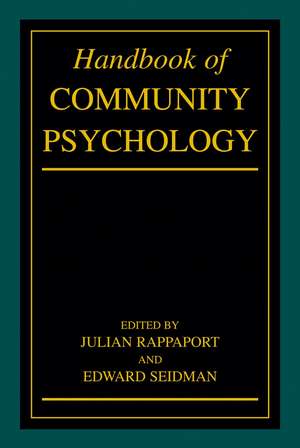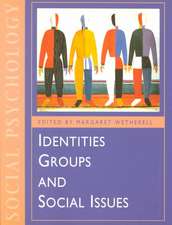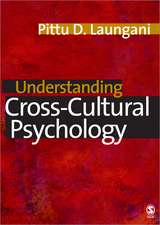Handbook of Community Psychology
Editat de Julian Rappaport, Edward Seidmanen Limba Engleză Paperback – 6 noi 2012
| Toate formatele și edițiile | Preț | Express |
|---|---|---|
| Paperback (1) | 2388.53 lei 38-44 zile | |
| Springer Us – 6 noi 2012 | 2388.53 lei 38-44 zile | |
| Hardback (1) | 3077.77 lei 43-57 zile | |
| Springer Us – 31 mai 2000 | 3077.77 lei 43-57 zile |
Preț: 2388.53 lei
Preț vechi: 3142.81 lei
-24% Nou
Puncte Express: 3583
Preț estimativ în valută:
457.09€ • 474.51$ • 381.15£
457.09€ • 474.51$ • 381.15£
Carte tipărită la comandă
Livrare economică 19-25 martie
Preluare comenzi: 021 569.72.76
Specificații
ISBN-13: 9781461368816
ISBN-10: 1461368812
Pagini: 1064
Ilustrații: XXIII, 1011 p.
Dimensiuni: 178 x 254 x 56 mm
Greutate: 1.98 kg
Ediția:Softcover reprint of the original 1st ed. 2000
Editura: Springer Us
Colecția Springer
Locul publicării:New York, NY, United States
ISBN-10: 1461368812
Pagini: 1064
Ilustrații: XXIII, 1011 p.
Dimensiuni: 178 x 254 x 56 mm
Greutate: 1.98 kg
Ediția:Softcover reprint of the original 1st ed. 2000
Editura: Springer Us
Colecția Springer
Locul publicării:New York, NY, United States
Public țintă
ResearchDescriere
As a field progresses, people write about their own work in journals, chapters, and books; but periodically the work needs to be collected and organized. It needs to be brought together in a format that can both introduce new members to the field and reacquaint continuing members with the work of their colleagues. Such a collection also affords an opportunity for the growing number of people with particular expertise to provide a reference for others whose work is related, but differs in focus. This is the first Handbook of Community Psychology. It contains contributions from 106 different authors, in addition to our editorial introductions. Its thirty-eight chapters (including two that are divided into multiple, individually authored parts) are concerned with conceptual frameworks, empirically grounded constructs, intervention strategies and tactics, social sys tems, design, assessment and analysis, cross-cutting professional issues, and contemporary intersections with community psychology. Although interrelated, each chapter stands on its own as a statement about a particular part of the field, and the volume can serve as a reference for those who may want to explore an area about which they are not yet familiar. To some extent community psychologists eschew the distinction between researcher and practitioner; and regardless of one's primary work environment (university, small college, practice setting, government, or grassroots organiza tion), there is something of interest for anyone who wants to explore the community psychol ogy approach.
Cuprins
Preface. Section I: Editors' Introduction - Concepts, Frameworks, Stories and Maps. 1. Prevention in Mental Health and Social Intervention: Conceptual and Methodological Issues in the Evolution of the Science and Practice of Prevention; R.D. Felner, et al. 2. Empowerment Theory: Psychological, Organizational and Community Levels of Analysis; M.A. Zimmerman. 3. Individualism, Collectivism, and Community Psychology; C. van Uchelen. 4. Community Psychology and Routes to Psychological Wellness; E.L. Cowen. 5. Towards an Integration of Behaviorism and Community Psychology; G.A. Bogat, L.A. Jason. 6. Cognition in Social Context: Contributions to Community Psychology; P. O'Neill. 7. Understanding and Changing Social Systems: An Ecological View; J.G. Kelly, et al. Section II: Editors' Introduction - People in Context: Empirically Grounded Constructs. 8. Psychological Dysfunction and Well-being: Public Health and Social Indicator Approaches; A.J. Zautra, K.M. Bachrach. 9. Stress: Theory, Research and Action; I.N. Sandler, et al. 10. Social Support Research in Community Psychology; M. Barrera Jr. 11. Citizen Participation and Community Organizations; A. Wandersman, P. Florin. 12. Power and Participation in the Workplace: Implications for Empowerment Theory, Research, and Practice; K.J. Klein, et al. Section III: Editors' Introduction - Intervention Strategies and Tactics. 13. Contextual Influences in Mental Health Consultation: Towards an Ecological Perspective on Radiating Change; E.J. Trickett, et al. 14. Community and Neighborhood Organisation; W. Berkowitz. 15. The Creation of Alternative Settings; C. Cherniss, G. Deegan. 16. Action-Oriented Mass Communication; A. McAlister. 17. Social Policy and Community Psychology; D.A. Phillips. 18. Dissemination of Innovation as Social Change; J.P. Mayer, W.S. Davidson II. Section IV: Editors' Introduction - Social Systems. 19. Prospects for a Viable Community Mental Health System: Reconciling Ideology, Professional Traditions, and Political Reality; K. Heller, et al. 20. Community-Based Health Interventions; T.A. Revenson, K.M. Schiaffino. 21. Religion in American Life: A Community Psychology Perspective; K.I. Pargament; K.I. Maton. 22. Community Change, Community Stasis, and the Law; G. Melton. 23. Helping Troubled Children and Families: A Paradigm of Public Responsibility; J. Knitzer. 24. The School Reform Movement: Opportunities for Community Psychology; D. Oxley. 25. Self-Help Groups; L.H. Levy. 26. Contributions from Organizational Psychology; M. Shinn, D.N.T. Perkins. Section V: Editors' Introduction - Design, Assessment and Analytic Methods. 27. Assessing Ecological Constructs and Community Context; J.A. Linney. 28. Cross-Level Research without Cross-ups in Community Psychology; M. Shinn, B.D. Rapkin. 29. Statistical Models for Change; J.S. Tanaka. 30. Thinking Through Others: Qualitative Research and Community Psychology; E. Stewart. Section VI: Editors' Introductio
Recenzii
"The book will be a useful reference for researchers working in the field of community psychology, and especially for those who need ready and convenient access to a state-of-the-art overview of community psychology research for grant applications and their own scholarly writing."
(Psychiatric Services, 52:11(2001)
"In short, this Handbook of Community Psychology is an exceptionally useful tool for mental health professionals, and especially for those involved in research or teaching. It is a handbook in the original sense of the word. That is, it is a book that many readers will want to keep close at hand."
(Psychiatric Services, 52:11(2001)
(Psychiatric Services, 52:11(2001)
"In short, this Handbook of Community Psychology is an exceptionally useful tool for mental health professionals, and especially for those involved in research or teaching. It is a handbook in the original sense of the word. That is, it is a book that many readers will want to keep close at hand."
(Psychiatric Services, 52:11(2001)
Caracteristici
Over 100 contributing authors with impressive academic stature provide a comprehensive, clear, and understandable review of various topics, allowing the reader convenient access to a state-of-the-art overview of community psychology research.














